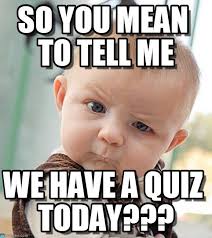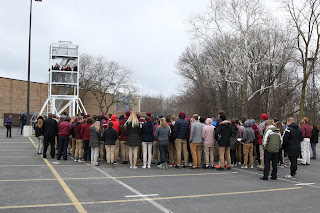Day 31: Spam & Relevancy
Yesterday, a student came in after having taken Saturday's SAT and reported that "There were vocabulary words on there that I learned in your class!" This is always a nice thing to hear, that my class is useful to students.
I needed that, because I overheard two of my AP students in the hallway later, and the only line I caught was, "I just don't think 17th century literature is relevant!" (Sidenote, the student who said this is one of my more brilliant ones; most students I have don't talk like this)
As he entered my class, I accosted him for the full conversation, and he admitted that he just felt there were other things going on in the world - for example, the government shutdown - that were more relevant to their lives than reading 17th century literature like The Scarlet Letter (which takes PLACE in the 17th, but was written in the 19th).
This comment really didn't bother me, but I pretended to be incensed: How DARE he suggest that archaic language and themes of adultery are not relevant to his 16-year-old existence? Didn't he KNOW my vocab words show up on the SATs? 100 years from now, high schoolers will probably still be forced to read The Scarlet Letter, but they will most likely not be tested on the details of the 2013 government shutdown - thus showing the lasting power of my AP English class!
~~~~~~~~~~~~~~~~~~~~~~~~~~~~~~~~~
But seriously, he has a point many high schoolers wonder about, just not as eloquently: how DO their classes actually apply to their daily lives? In my 6th period English 3 class yesterday, we had a perfect relevant teaching moment delivered to us.
Last year, one of my students received a spam email from some terminally ill, Muslim lady in Africa telling him she wanted to give him all her dead husband's money. I'm sorry to say, this student thought this was fantastic news, and brought me the email triumphantly. I had to break his little heart and explain that not only was this woman probably not real ("But look Miss! She attached a photo!"), why oh why, dear student, would she A) Give her husband's money away to a stranger B) pick someone who isn't Muslim and C) choose him? I made him swear to me to never ever give his bank account information to anyone from the internet, EVER, and that if it sounded too good to be true, it was. We had this conversation in front of the whole class last year, because I wanted to make sure all my students knew it.
So anyway, a student who had been in that class whom I have again reported back to me today with a new email - this one had to be legit. It was one of those where the sender included a (grammatically incorrect) bio including big words and impressive titles (I'm not sure Yale has a Ph.D program in Environmental Ecology). ALL the sender wanted my student to do was send his address, and he would receive a check. ALL he needed to do then was deposit the check, keep $600 for himself, take out $100 for a wire transfer, and wire the other $2800 to Mexico. The student insisted it was real because "He didn't ask for my social security or bank account number, 'cuz you told us that's how we know they're fake!"
I wish I was kidding, but my student didn't remotely pause to think this email might be suspicious. No, my student responded with his address, and that morning UPS DELIVERED A CHECK.
He showed me the first email, and we put it on the board and dissected its issues: "Student, if this person actually WERE CEO of this huge firm in the UK, why would he ask a 17-year-old American to wire his money? Did you give your information to this "hiring firm" where he claims he got it? Why would he offer to pay you without meeting you or doing anything first?"
Then, the student forwarded the second email with his "first assignment" and instructions for what to do with the check. I told him to take the emails and the check and go immediately to the police. Do NOT deposit the check. Do NOT contact this person again. Thankfully he followed my advice and did it right after school that day. He didn't seem to understand why he might be liable for the money...
We finished this discussion by talking about how people on Craigslist have a tendency to sell cars they don't actually own, and my students looked aghast. It's funny...I've heard people claim this generation is so cynical and skeptical, but they're more gullible and trusting than anyone I've ever met.
~~~~~~~~~~~~~~~~~~~~~~~~~~
To appease my disgruntled AP student, we read editorials on Obamacare and discussed health insurance today. He thanked me for my attention to my students' every whim...
I needed that, because I overheard two of my AP students in the hallway later, and the only line I caught was, "I just don't think 17th century literature is relevant!" (Sidenote, the student who said this is one of my more brilliant ones; most students I have don't talk like this)
As he entered my class, I accosted him for the full conversation, and he admitted that he just felt there were other things going on in the world - for example, the government shutdown - that were more relevant to their lives than reading 17th century literature like The Scarlet Letter (which takes PLACE in the 17th, but was written in the 19th).
This comment really didn't bother me, but I pretended to be incensed: How DARE he suggest that archaic language and themes of adultery are not relevant to his 16-year-old existence? Didn't he KNOW my vocab words show up on the SATs? 100 years from now, high schoolers will probably still be forced to read The Scarlet Letter, but they will most likely not be tested on the details of the 2013 government shutdown - thus showing the lasting power of my AP English class!
~~~~~~~~~~~~~~~~~~~~~~~~~~~~~~~~~
But seriously, he has a point many high schoolers wonder about, just not as eloquently: how DO their classes actually apply to their daily lives? In my 6th period English 3 class yesterday, we had a perfect relevant teaching moment delivered to us.
Last year, one of my students received a spam email from some terminally ill, Muslim lady in Africa telling him she wanted to give him all her dead husband's money. I'm sorry to say, this student thought this was fantastic news, and brought me the email triumphantly. I had to break his little heart and explain that not only was this woman probably not real ("But look Miss! She attached a photo!"), why oh why, dear student, would she A) Give her husband's money away to a stranger B) pick someone who isn't Muslim and C) choose him? I made him swear to me to never ever give his bank account information to anyone from the internet, EVER, and that if it sounded too good to be true, it was. We had this conversation in front of the whole class last year, because I wanted to make sure all my students knew it.
 |
| http://drybonesblog.blogspot.com/2012_02_01_archive.html |
So anyway, a student who had been in that class whom I have again reported back to me today with a new email - this one had to be legit. It was one of those where the sender included a (grammatically incorrect) bio including big words and impressive titles (I'm not sure Yale has a Ph.D program in Environmental Ecology). ALL the sender wanted my student to do was send his address, and he would receive a check. ALL he needed to do then was deposit the check, keep $600 for himself, take out $100 for a wire transfer, and wire the other $2800 to Mexico. The student insisted it was real because "He didn't ask for my social security or bank account number, 'cuz you told us that's how we know they're fake!"
I wish I was kidding, but my student didn't remotely pause to think this email might be suspicious. No, my student responded with his address, and that morning UPS DELIVERED A CHECK.
He showed me the first email, and we put it on the board and dissected its issues: "Student, if this person actually WERE CEO of this huge firm in the UK, why would he ask a 17-year-old American to wire his money? Did you give your information to this "hiring firm" where he claims he got it? Why would he offer to pay you without meeting you or doing anything first?"
Then, the student forwarded the second email with his "first assignment" and instructions for what to do with the check. I told him to take the emails and the check and go immediately to the police. Do NOT deposit the check. Do NOT contact this person again. Thankfully he followed my advice and did it right after school that day. He didn't seem to understand why he might be liable for the money...
We finished this discussion by talking about how people on Craigslist have a tendency to sell cars they don't actually own, and my students looked aghast. It's funny...I've heard people claim this generation is so cynical and skeptical, but they're more gullible and trusting than anyone I've ever met.
~~~~~~~~~~~~~~~~~~~~~~~~~~
To appease my disgruntled AP student, we read editorials on Obamacare and discussed health insurance today. He thanked me for my attention to my students' every whim...





Comments
Post a Comment